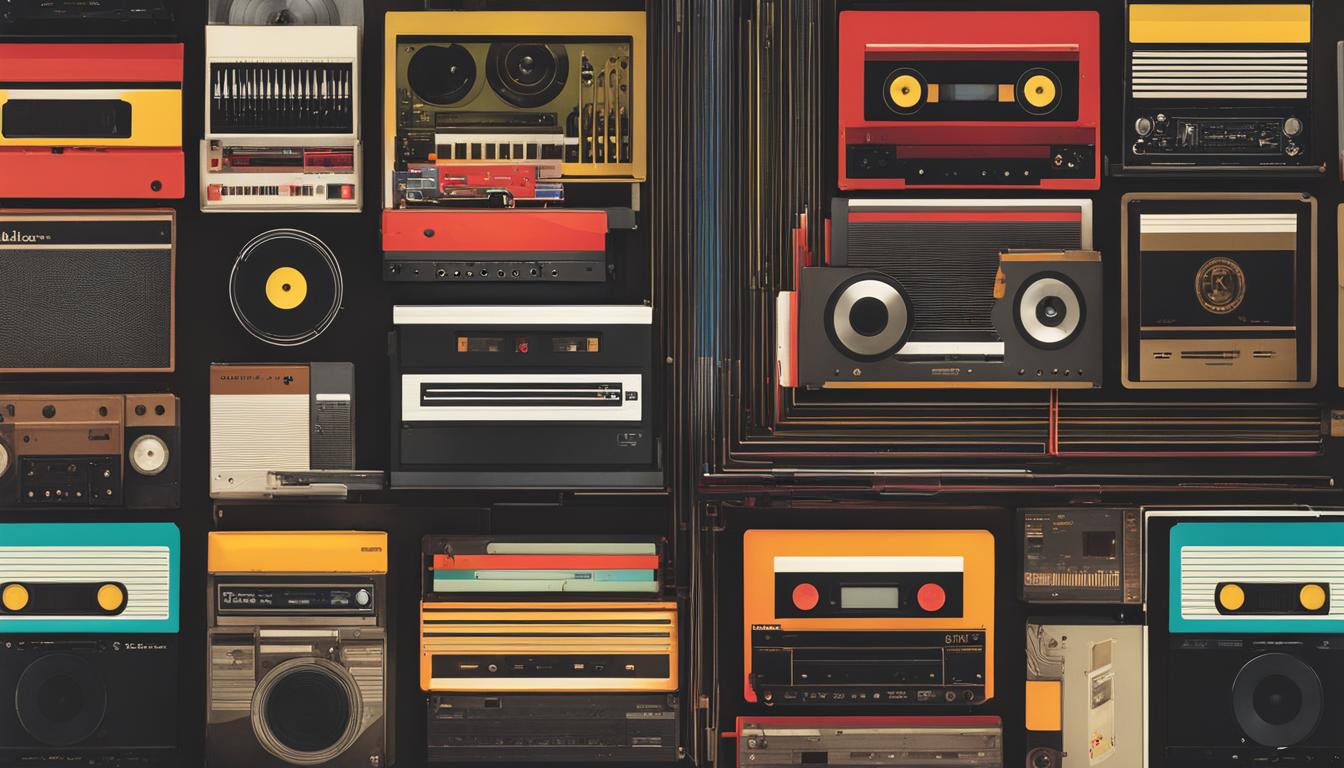
Music technology refers to the study and use of devices, mechanisms, machines, or tools by musicians or composers for creating, performing, recording, analyzing, or editing music. It encompasses a wide range of innovations and tools that have transformed how we create, produce, and experience music. From mechanical music technologies to electric and electronic music technologies, music technology has evolved throughout history to shape the way music is made and consumed.
Key Takeaways:
- Music technology involves the use of devices and tools to create, perform, record, and edit music.
- It has evolved over time, from mechanical music technologies to electric and electronic music technologies.
- Music technology has revolutionized the music industry, enabling new possibilities in composition, production, and performance.
- It plays a significant role in education, offering opportunities for students to learn and engage with music.
- The future of music technology is promising, with advancements and trends continuously emerging.
History of Music Technology
The history of music technology is marked by continuous innovation and advancements that have revolutionized the way music is created, produced, and experienced. From the earliest tools used by prehistoric humans to the digital revolution of the late 20th century, music technology has continually evolved, pushing the boundaries of what is possible in the world of music.
In prehistoric times, early humans used tools to create simple flutes, laying the foundation for the development of musical instruments. Ancient civilizations such as the Egyptians and Greeks further advanced the field with the creation of stringed and wind instruments.
The Middle Ages introduced music notation, allowing for the written preservation and dissemination of musical compositions. This significant innovation enabled musicians and composers to share their work and contributed to the development of musical theory.
The Renaissance and Baroque eras brought further advancements in music technology, particularly in keyboard instruments such as the harpsichord and pipe organ. These instruments, along with developments in orchestral compositions, enriched the complexity and depth of musical expression.
However, it was in the 20th century that music technology witnessed groundbreaking advancements. The invention of sound recording and multitrack recording revolutionized music production, enabling artists to experiment with new sounds and layer different instruments and tracks. This led to the emergence of new genres and instruments, pushing the boundaries of musical creativity.
The digital revolution in the late 20th century marked a significant turning point in music technology. Digital synthesizers, drum machines, and music sequencers became widely available, providing musicians with new tools and possibilities for composition and production. This era saw the rise of electronic music genres and the blending of traditional instruments with digital sounds.
Innovation in Music Technology
“Music technology has constantly pushed the boundaries of what is possible in the world of music, enabling musicians and composers to explore new sounds, experiment with different techniques, and create innovative compositions.”
The continuous evolution of music technology has led to the development of a wide range of devices, tools, and software that have transformed the music industry and shaped the way we create and consume music. From analog synthesizers to virtual instruments, music technology advancements have provided endless possibilities for musicians, producers, and enthusiasts alike.
Table: Advancements in Music Technology
| Advancements | Innovation |
|---|---|
| Sound Recording | Revolutionized music production, allowing for the preservation and distribution of music |
| Multi-track Recording | Enabled artists to layer different instruments and tracks, fostering experimentation with new sounds |
| Digital Synthesizers | Opened up new possibilities for sound manipulation and synthesis, resulting in the emergence of electronic music genres |
| Drum Machines | Provided musicians with programmable rhythm patterns, facilitating the creation of complex beats and rhythms |
| Music Sequencers | Allowed for precise control and arrangement of musical elements, enhancing the workflow of composers and producers |
Music technology continues to evolve, with ongoing advancements in virtual instruments, software-based production tools, and computer-generated music. These trends shape the future of music creation and production, promising even more exciting possibilities for musicians and music enthusiasts to explore.
Mechanical Music Technologies
Mechanical music technologies encompass a fascinating array of devices and instruments that rely on intricate mechanical mechanisms for producing music. These innovative creations have played a crucial role in the evolution of music instruments and paved the way for future advancements in music technology.
From the early days of human civilization, mechanical music technologies have been utilized to create beautiful melodies and harmonies. Prehistoric humans, driven by a deep desire for artistic expression, harnessed their ingenuity to fashion musical tools, such as flutes, from rudimentary materials. These early mechanical innovations marked the humble beginnings of music technology.
As civilizations emerged and flourished, so too did their musical creations. Ancient cultures like the Egyptians and Greeks developed a multitude of instruments, ranging from lyres and harps to elaborate pipe organs. These magnificent devices relied on intricate mechanical systems to produce enchanting melodies that transported listeners to ethereal realms. The legacy of these ancient mechanical music technologies continues to resonate in modern music production and composition.
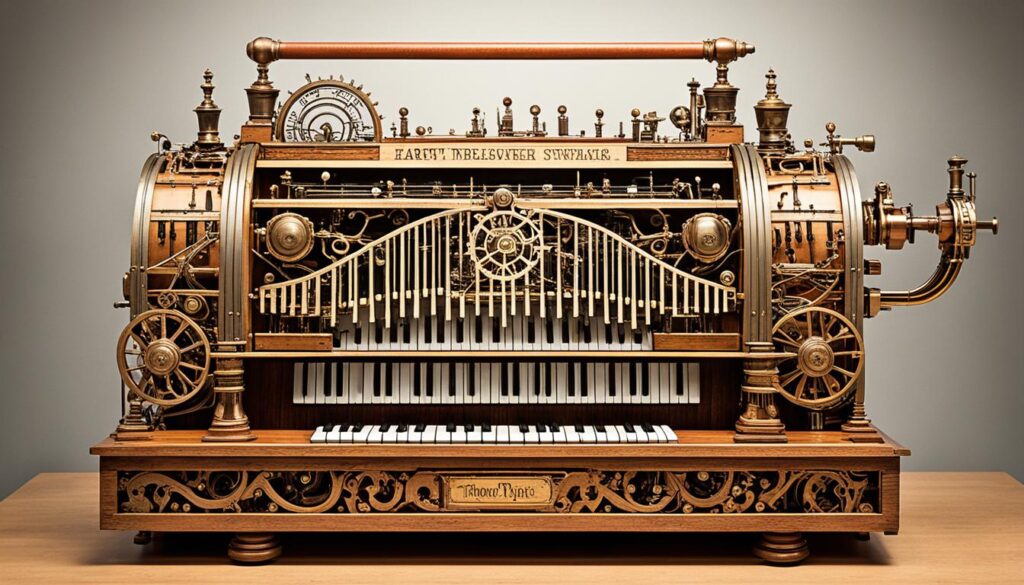
In the Renaissance and Baroque eras, mechanical music technologies reached new heights. Innovations such as music boxes and automated musical clocks captivated audiences with their intricate mechanisms and melodious tunes. These mechanical marvels showcased the ingenuity of their creators, inspiring future generations of musicians and inventors to push the boundaries of what was possible in music.
Furthermore, mechanical music technologies played an integral role in the development of keyboard instruments. The invention of the piano, harpsichord, and pipe organ introduced a new level of expressiveness and versatility to musical compositions. The mechanical actions and mechanisms employed in these instruments allowed musicians to convey emotions and nuances with unprecedented clarity and finesse.
Overall, mechanical music technologies have significantly contributed to the ever-evolving world of music. These early innovations set the stage for future advancements in music technology, shaping the way we create and experience music today.
| Advancements | Instruments |
|---|---|
| Development of music boxes and automated musical clocks | Music boxes, automated musical clocks |
| Invention of keyboard instruments – piano, harpsichord, pipe organ | Piano, harpsichord, pipe organ |
These achievements demonstrate the lasting impact of mechanical music technologies and their influence on the evolution of musical instruments and the broader field of music technology.
Electronic and Digital Music Technologies
Electric, electronic, and digital music technologies have revolutionized the way we create, manipulate, and experience music. These cutting-edge tools, devices, and software have opened up a world of possibilities for musicians, producers, and music enthusiasts alike. Let’s explore the advancements and trends in electronic and digital music technologies that have shaped the music industry.
Electric Instruments: Expanding Sonic Horizons
At the beginning of the 20th century, the invention of electric instruments introduced new sounds and expanded the sonic palette available to musicians. The electric piano, electric guitar, and electric bass transformed the way music was played and composed, paving the way for genres like jazz, rock, and pop to flourish.
The Synthesizer Revolution
In the 1960s and 1970s, the development of synthesizers and drum machines revolutionized music production. These innovative devices allowed musicians to create otherworldly sounds and experiment with unique textures. The iconic Moog synthesizer and the Roland TR-808 drum machine became cornerstones of electronic music, shaping genres such as disco, techno, and hip-hop.
Digital Innovation: From Chips to Sequencers
The rise of powerful microchips and digital technology in the 1980s propelled the evolution of electronic music further. Digital synthesizers, drum machines, and music sequencers became more accessible and affordable, empowering musicians to produce intricate compositions with ease. The digital revolution opened up endless possibilities for sound manipulation and experimentation.
Trends Shaping the Future
Today, electronic and digital music technologies continue to evolve at a rapid pace, with new trends shaping the future of music creation and production. Here are some exciting developments:
- Virtual Instruments: Cutting-edge virtual instruments offer realistic emulations of traditional instruments, expanding the creative options for composers and producers.
- Software-Based Production Tools: Computer software has become integral to music production, with powerful digital audio workstations (DAWs) and plugins enabling artists to craft professional-quality music from the comfort of their own studios.
- Computer-Generated Music: Advancements in artificial intelligence and machine learning have led to the emergence of computer-generated music, blurring the line between human and technological composition.
These trends indicate that the future of music technology is full of innovation and possibilities. As electronic and digital music technologies continue to push the boundaries of what is musically achievable, artists and music enthusiasts can look forward to more exciting developments in the years to come.
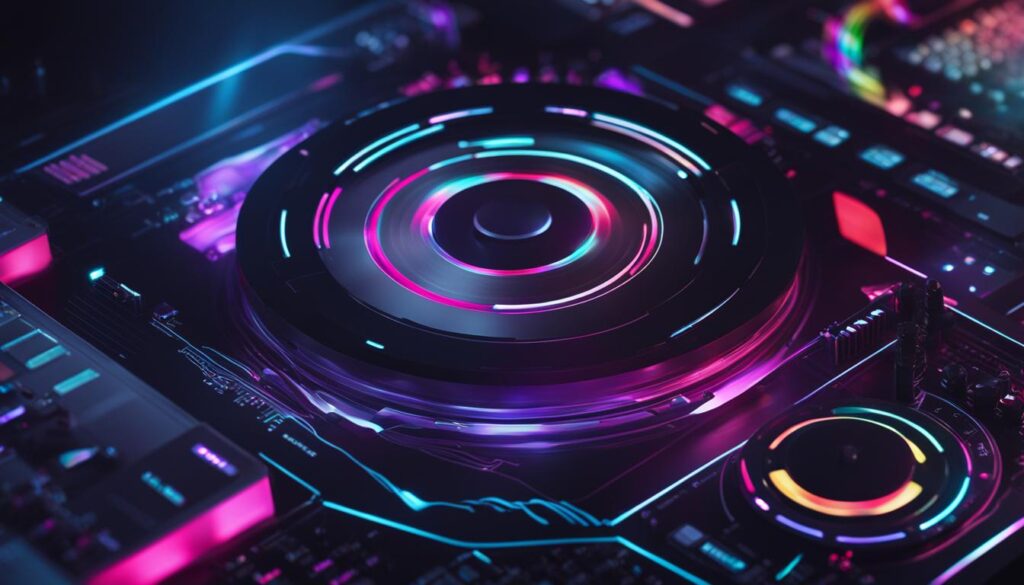
Music Technology in Education
Music technology is transforming education, providing students with unique opportunities to explore, create, and engage with music. Universities and institutions across the globe are offering specialized courses and programs dedicated to music technology, preparing students for lucrative careers in various fields.
These programs provide training in areas such as sound engineering, computer music, audio-visual production, software development, and multimedia production. By equipping students with the necessary skills and knowledge, music technology education opens doors to diverse career paths in the music industry.
Furthermore, music technology is widely incorporated into schools and colleges to introduce students to music theory, composition, and production. Through hands-on learning experiences, students can explore different aspects of music technology and develop their creative and technical skills.
Whether students want to pursue careers as sound engineers, music producers, composers, or multimedia artists, music technology education offers a solid foundation and the practical skills required for success.
Key Benefits of Music Technology in Education:
- Enhances music learning and understanding through interactive tools and software
- Facilitates exploration of different music genres and styles
- Promotes collaboration and teamwork among students
- Provides opportunities for creative expression and self-discovery
- Prepares students for careers in music production, sound engineering, and more
By integrating music technology into education, we equip today’s students with the skills and knowledge necessary to excel in the ever-evolving music industry. This enables them to harness the power of technology to create, innovate, and shape the future of music.
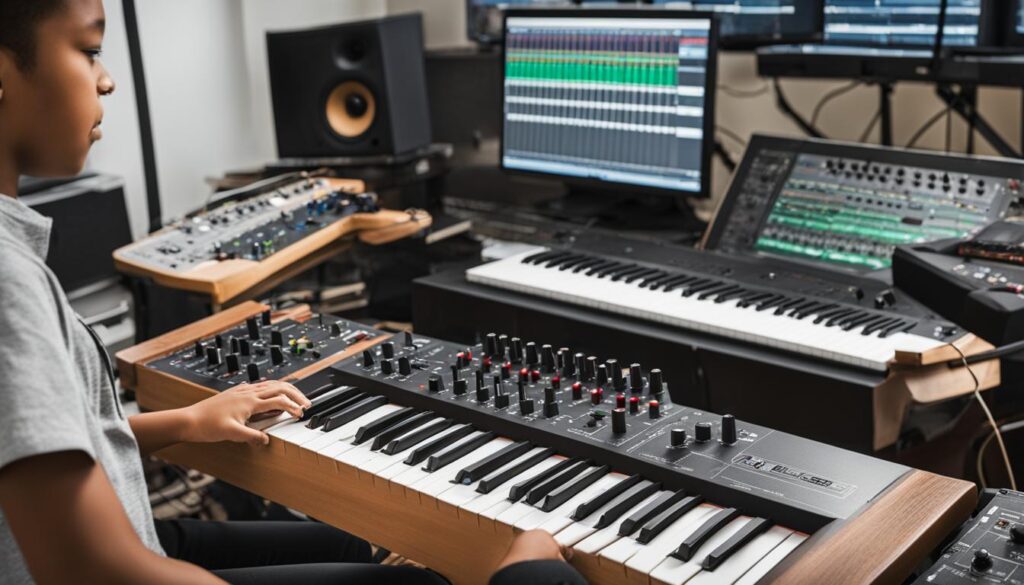
Music Technology Careers
Careers in music technology offer exciting opportunities for individuals passionate about music and technology. With the rapid advancement of technology, the demand for skilled professionals in this field has increased.
Sound engineering is a popular career choice in music technology, involving the recording, mixing, and mastering of music. Sound engineers work in recording studios, live performances, and post-production settings, ensuring the highest quality sound for various media platforms.
Computer music professionals specialize in the creation and manipulation of music using computer software and hardware. They are adept at utilizing digital audio workstations, MIDI controllers, and programming languages to compose, produce, and perform music.
Audio-visual production is another promising music technology career path, involving the creation of multimedia content that combines audio and visual elements. Professionals in this field work on projects like music videos, commercials, film soundtracks, and interactive installations.
Software development in the music industry has also become crucial, with the rising demand for music production software, virtual instruments, and plugins. Music technology professionals with programming skills are responsible for developing innovative software solutions that enhance music creation and production.
By pursuing a career in music technology, individuals can combine their passion for music with their technical skills, contributing to the creation and delivery of exceptional musical experiences.
Analog Synthesizers and Digital Synthesizers
In the world of music technology, analog synthesizers and digital synthesizers are instrumental devices that have shaped the sound of electronic music. These devices are essential tools for musicians and producers, offering unique capabilities and sonic possibilities.
Analog synthesizers, such as the iconic Moog Minimoog and the legendary Roland TB-303, use analog circuitry to generate sounds. These instruments produce rich, warm tones that are highly sought after by musicians and enthusiasts. Analog synthesizers allow for real-time manipulation of sound parameters through physical knobs and sliders, providing a tactile and hands-on approach to music creation.
On the other hand, digital synthesizers utilize digital technologies to produce and manipulate sound. Popular digital synthesizers like the groundbreaking Fairlight CMI and the iconic Korg M1 brought digital sound synthesis to the forefront of music production. Digital synthesizers offer a vast range of sounds and textures, with the ability to recreate realistic instrument sounds or create entirely new and unique timbres.
Both analog synthesizers and digital synthesizers have played a crucial role in shaping the electronic music landscape. They have been used across various genres, from early electronic pioneers like Kraftwerk and Jean-Michel Jarre to contemporary electronic artists like Daft Punk and Aphex Twin.
“Analog and digital synthesizers are the backbone of electronic music. They provide endless possibilities for sound design and allow musicians to create their sonic signature.” – Robert Moog, Founder of Moog Music
Comparison of Analog Synthesizers and Digital Synthesizers
| Aspect | Analog Synthesizers | Digital Synthesizers |
|---|---|---|
| Sound Generation | Analog circuitry | Digital algorithms |
| Tonal Characteristics | Warm, rich, and organic | Versatile, precise, and clean |
| Real-Time Control | Physical knobs and sliders | Software interfaces and MIDI controllers |
| Patch Memory | Limited or absent | Extensive, with preset sounds and user patches |
| Cost | Varies, often higher | Varies, often lower |
While analog synthesizers offer a distinct sonic character and an intuitive, hands-on experience, digital synthesizers provide greater versatility, precision, and the convenience of extensive patch memory. Both types of synthesizers have their strengths and cater to different musical preferences and production workflows.
Whether it’s the warm and organic tones of analog synthesizers or the limitless possibilities of digital synthesis, these music technology devices continue to inspire musicians and push the boundaries of sonic exploration. They remain vital tools in the ever-evolving world of music production and performance.
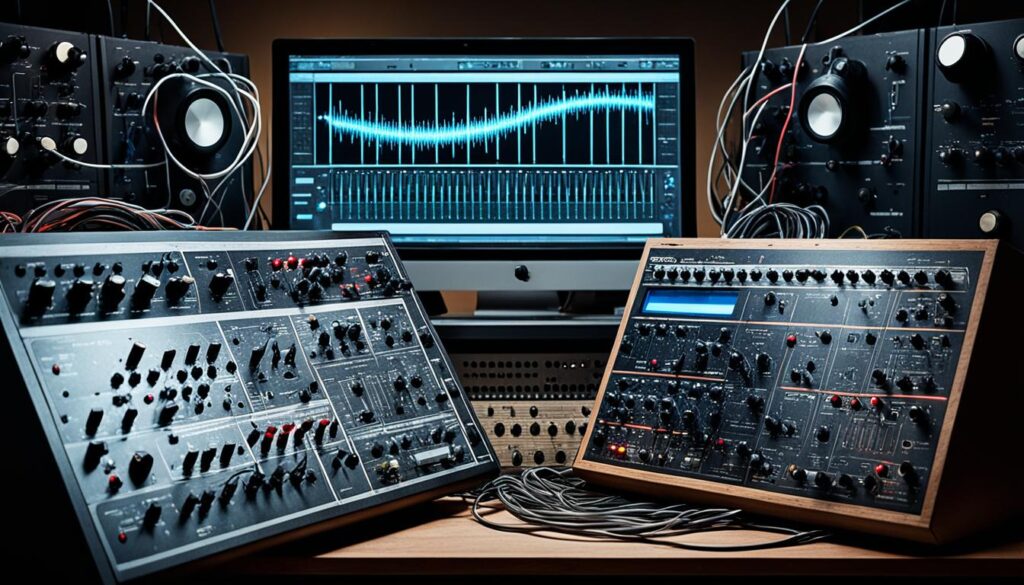
How Does Acura Technology Package Compare to Music Technology?
The Acura Technology Package definition encompasses various advanced features like navigation, premium sound systems, and driver assistance technologies. Comparing it to music technology, the former focuses on enhancing the overall driving experience while the latter revolves around the audio systems and connectivity options for music enjoyment. Both technologies cater to different aspects but contribute to a captivating and immersive experience.
Conclusion
Over the years, music production technology has revolutionized the music industry, empowering musicians, composers, and producers to create, produce, and experience music in ways that were once unimaginable. From the humble beginnings of early mechanical instruments to the cutting-edge digital synthesizers and production tools of today, music technology has continuously pushed the boundaries of what is possible in music.
The advancements in music production technology have opened up endless opportunities for creativity and innovation. Musicians can now explore new sounds and textures, experiment with different production techniques, and seamlessly blend genres to create unique and compelling compositions. The availability of sophisticated software and hardware tools has democratized music production, making it accessible to aspiring artists around the world.
Looking ahead, the future of music production technology holds great promise. With ongoing advancements in digital processing, artificial intelligence, virtual reality, and immersive audio technologies, we can expect to see even more exciting developments in the field. New tools and devices will continue to emerge, providing musicians with fresh ways to express themselves and engage their audiences.
Whether in the realm of education, production, or performance, music production technology will undoubtedly shape the way we engage with music for years to come. It enables us to explore the boundaries of our artistic potential, break new ground, and push the limits of creativity. As we embrace these advancements, we unlock a world of possibilities, ensuring that the future of music remains vibrant and ever-evolving.








